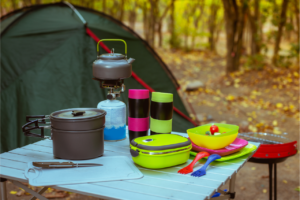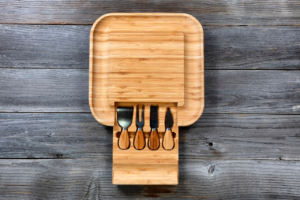Are you on the lookout for eco-friendly options to add to your camping gear? Look no further! In this article, we will explore a variety of eco-friendly camping cookware. Whether you’re an avid backpacker or a weekend camper, finding cookware that is kind to the planet is essential. From biodegradable plates to portable solar cookers, we’ve got you covered. So, let’s dive in and discover the best eco-friendly options for all your camping cooking needs.
Benefits of Eco-friendly Camping Cookware
Camping is a fantastic way to reconnect with nature, but it’s important to remember our responsibility to the environment while enjoying the great outdoors. One easy way to minimize our impact on the environment is by using eco-friendly camping cookware. Here are some of the key benefits:
Reduces environmental impact
By opting for eco-friendly camping cookware, you can significantly reduce your environmental impact. Traditional cookware often contains harmful chemicals and is made from non-renewable resources, contributing to pollution and the depletion of natural resources. Eco-friendly cookware, on the other hand, is designed with the environment in mind, employing sustainable materials and manufacturing processes.
Minimizes use of non-renewable resources
Eco-friendly camping cookware is typically made from materials that are renewable or have a low environmental impact. By choosing cookware made from sustainable materials, such as stainless steel, cast iron, or titanium, you can minimize your reliance on non-renewable resources like fossil fuels.
Avoids harmful chemicals
Many conventional camping cookware options contain toxic chemicals, such as perfluorooctanoic acid (PFOA) and bisphenol-A (BPA). These chemicals can leach into your food and have been linked to various health issues. Eco-friendly cookware is typically free from these harmful substances, ensuring that your meals are safe and healthy.
Promotes sustainability
Eco-friendly camping cookware promotes sustainable practices, both in terms of its production and long-term use. Choosing cookware from brands that prioritize sustainability can help support their efforts to reduce waste, promote recycling, and invest in eco-friendly manufacturing processes. By making conscious choices, you can contribute to a more sustainable camping experience for yourself and future generations.
Materials for Eco-friendly Camping Cookware

When looking for eco-friendly camping cookware, there are several materials to consider. Each material has its own advantages and characteristics. Here are some popular options:
Stainless steel
Stainless steel is a durable and versatile material that is commonly used in eco-friendly camping cookware. It is resistant to rust, easy to clean, and does not react with acidic food. Stainless steel cookware is also known for its excellent heat distribution, ensuring that your meals are cooked evenly.
Cast iron
Cast iron cookware has been used for centuries and is renowned for its excellent heat retention properties. It is incredibly durable and can withstand high cooking temperatures, making it ideal for camping. Although cast iron requires special care and maintenance, its longevity and versatility make it a popular choice for eco-friendly campers.
Titanium
Titanium is a lightweight and durable material that is perfect for backpacking and camping trips. It offers excellent heat distribution and is resistant to corrosion. Titanium cookware is also known for its non-stick surface, reducing the need for excessive oil or butter during cooking.
Aluminum
Aluminum is a lightweight material that is commonly used in eco-friendly camping cookware. It heats up quickly and evenly, making it ideal for cooking meals efficiently. However, it’s important to choose aluminum cookware that is coated with a non-toxic finish to avoid any potential health risks associated with aluminum exposure.
Enamel-coated
Enamel-coated cookware is typically made from steel or cast iron and coated with a layer of enamel for added durability and non-stick properties. This type of cookware is easy to clean and offers excellent heat distribution. However, it’s important to choose enamel coatings that are free from harmful chemicals like lead or cadmium.
Bamboo

Bamboo is a sustainable and renewable material that is gaining popularity in the camping cookware industry. It is lightweight, durable, and naturally antimicrobial. Bamboo utensils, plates, and bowls are great eco-friendly alternatives to single-use plastic options.
Silicone
Silicone is a non-toxic and heat-resistant material that is often used in camping cookware. It is lightweight, easy to clean, and does not retain odors or flavors. Silicone cookware, such as collapsible bowls or cups, is perfect for saving space in your camping gear.
Eco-friendly Cookware Brands
There are several eco-friendly cookware brands that specialize in creating sustainable camping cookware. Here are some reputable brands to consider:
EcoCamp
EcoCamp offers a range of eco-friendly camping cookware made from high-quality materials. Their cookware sets are designed with durability and sustainability in mind, ensuring that you can enjoy delicious meals while minimizing your environmental impact.
GSI Outdoors
GSI Outdoors is known for its commitment to producing eco-friendly camping cookware. They offer a variety of cookware sets made from recycled or recyclable materials, ensuring that you can enjoy your camping adventures without harming the planet.
Toaks
Toaks specializes in lightweight and durable camping cookware made from titanium. Their cookware sets are designed with efficiency in mind, allowing you to carry less weight while enjoying delicious meals in the great outdoors.
Snow Peak
Snow Peak is a renowned brand in the camping industry, offering eco-friendly cookware sets made from high-quality materials. Their cookware is designed to last, ensuring that you can enjoy your camping trips for years to come.
Kupilka
Kupilka combines traditional and sustainable materials to create durable and eco-friendly camping cookware. Their cookware sets are made from a unique biocomposite material, combining wood fibers and plastic, resulting in a lightweight and eco-friendly alternative to traditional plastic cookware.
BioLite
BioLite specializes in innovative and sustainable camping cookware. Their cookware sets are designed to incorporate renewable energy sources, allowing you to harness the power of the sun to cook your meals while minimizing your environmental impact.
Lodge
Lodge is a trusted brand in cast iron cookware, known for its durability and craftsmanship. Their cast iron cookware is made from recycled iron and is pre-seasoned, reducing the need for excessive oil or butter during cooking.
Sea to Summit
Sea to Summit offers a wide range of eco-friendly camping cookware, including lightweight and collapsible options. Their cookware sets are designed with space-saving in mind, ensuring that you can bring all the necessary tools for your camping adventures without taking up too much space in your backpack.
Keith Titanium
Keith Titanium specializes in titanium camping cookware, offering a range of lightweight and durable options. Their cookware sets are designed for efficiency and durability, ensuring that you can enjoy your meals in the great outdoors without worrying about the environmental impact.
Features to Look for in Eco-friendly Camping Cookware
When choosing eco-friendly camping cookware, there are several key features to consider. By prioritizing these features, you can ensure that your cookware aligns with your environmental values. Here are some important features to look for:
Recyclability
Opt for cookware that is made from recyclable materials or is itself recyclable. This ensures that at the end of its life, the cookware can be repurposed or recycled, reducing waste and minimizing its impact on the environment.
BPA-free
Choose cookware that is certified BPA-free to avoid any potential health risks associated with this harmful chemical. BPA has been linked to various health issues, so it’s important to prioritize cookware that is free from this substance.
Non-toxic/non-metallic finishes
Ensure that the cookware you choose has non-toxic or non-metallic finishes to avoid any potential leaching of harmful substances into your food. Look for cookware with ceramic, glass, or enamel coatings as alternatives to traditional non-stick coatings.
Lightweight and compact
For camping trips, it’s essential to choose cookware that is lightweight and compact. This allows for easy transportation and ensures that it won’t take up too much space in your camping gear.
Durability
Invest in cookware that is built to last. Durable cookware reduces the need for frequent replacements, minimizing waste and saving resources in the long run.
Heat distribution
Look for cookware that offers even heat distribution to ensure that your meals are cooked thoroughly and evenly. This improves cooking efficiency and helps you enjoy delicious meals in nature.
Versatility
Choose cookware that can be used in different ways and for different cooking methods. Versatile cookware allows you to prepare a variety of meals without the need for multiple pots and pans.
Easy to clean
Consider cookware that is easy to clean, as this reduces the need for excessive water or harsh detergents while camping. Look for cookware with non-stick surfaces or materials that can be easily wiped clean.
A Guide to Eco-friendly Cookware Maintenance
Proper maintenance and care are essential to prolong the lifespan of your eco-friendly camping cookware. By following these tips, you can ensure that your cookware stays in great condition for many camping trips to come:
Proper cleaning techniques
Always clean your cookware promptly after use to prevent food particles from sticking and becoming difficult to remove. Use biodegradable soap and a non-abrasive sponge or brush to clean your cookware, taking care not to scratch any non-stick surfaces.
Avoiding harsh chemicals
When cleaning your cookware, avoid using harsh chemicals or abrasive cleaners, as they can damage the non-stick coatings or surfaces. Opt for eco-friendly cleaning solutions that are free from toxic chemicals.
Seasoning cast iron cookware
If you have cast iron cookware, it’s important to season it regularly to maintain its non-stick properties and prevent rusting. Seasoning involves applying a thin layer of oil to the surface of the cookware and heating it to create a protective layer. Follow the manufacturer’s instructions for the specific seasoning requirements of your cast iron cookware.
Storing cookware properly
Store your cookware in a cool and dry place to prevent moisture and humidity from causing rust or damage. Avoid stacking heavy items on top of delicate cookware to prevent warping or breakage. Keeping your cookware in good condition will ensure its longevity and minimize the need for replacements.
Eco-friendly Campfire Cooking
Campfire cooking is a beloved tradition for many campers, but it’s important to practice eco-friendly cooking techniques to minimize your impact on the environment. Here are some tips for eco-friendly campfire cooking:
Using biodegradable soap
When washing your camping cookware, opt for biodegradable soap to avoid polluting nearby water sources. Biodegradable soap is designed to break down naturally, minimizing its impact on the environment.
Collecting firewood sustainably
If you’re building a fire for cooking, collect firewood sustainably. Avoid cutting down live trees and instead opt for deadfall or fallen branches. By respecting the natural environment, you can minimize your impact on the ecosystem.
Opting for natural igniters
Instead of using chemical-laden fire starters, opt for natural igniters such as dry leaves, twigs, or paper. These natural materials are readily available and do not contribute to pollution or harm the environment.
Avoiding disposable cookware
Choose reusable cookware and utensils instead of disposable options. Disposable cookware contributes to waste and pollution, while reusable alternatives can be used for multiple camping trips, reducing your environmental impact.
Leaving no trace
After cooking, make sure to properly extinguish your campfire and clean up any debris or food scraps. Leave the campsite as you found it, ensuring that you leave no trace of your presence. This helps preserve the natural beauty of the environment and allows future campers to enjoy the same experience.
Best Eco-friendly Cookware Sets for Camping
Now that we’ve explored the benefits of eco-friendly camping cookware and the features to look for, let’s take a look at some of the best cookware sets available:
EcoCamp – 5 Piece Camping Cookware Set
The EcoCamp 5 Piece Camping Cookware Set includes a pot, pan, lid, and two bowls, all made from durable stainless steel. This set is lightweight, compact, and designed for outdoor use, making it perfect for camping and backpacking trips.
GSI Outdoors – Pinnacle Camper Cookset
The GSI Outdoors Pinnacle Camper Cookset is a comprehensive cookware set that includes pots, pans, and various utensils. It is made from high-quality, non-stick materials and comes with a convenient carrying case for easy transportation.
Toaks – Titanium 3-Piece Pot and Pan Set
The Toaks Titanium 3-Piece Pot and Pan Set is made from lightweight and durable titanium. It includes a pot, pan, and a lid that also doubles as a plate. This set is perfect for minimalist campers who prioritize lightweight gear.
Snow Peak – Titanium Cookware Set
The Snow Peak Titanium Cookware Set is renowned for its durability and heat distribution. The set includes a pot, frypan, and various accessories, all made from lightweight titanium. It is designed for long-lasting performance and is suitable for both camping and backpacking trips.
Kupilka – Camping Dish Set
Kupilka offers a range of eco-friendly camping dish sets made from a unique biocomposite material. This material combines wood fibers and plastic, resulting in durable, lightweight, and eco-friendly camping dishes. The dish sets are available in various sizes and include plates, bowls, and cups.
BioLite – KettlePot
The BioLite KettlePot is a versatile and eco-friendly cookware option. It functions as both a pot and a kettle, allowing you to cook meals and boil water with ease. This lightweight and compact cookware can be used in conjunction with BioLite’s innovative camping stoves, which utilize renewable energy sources.
DIY Eco-friendly Cooking Utensils
If you enjoy DIY projects, here are some eco-friendly cooking utensils that you can make yourself:
Bamboo utensils
Bamboo utensils are easy to make and a great alternative to single-use plastic utensils. Simply carve or shape the bamboo sticks into spoons, forks, or chopsticks, and sand them to create smooth edges.
Wooden spatulas
Wooden spatulas are an eco-friendly alternative to plastic or silicone spatulas. You can easily make your own by carving or shaping a piece of untreated wood into the desired shape and sanding it down for a smooth finish.
DIY tin can stove
A DIY tin can stove is a simple yet effective way to cook meals while camping. Clean and empty a large tin can, punch holes around the top edge for ventilation, and fill it with your preferred fuel source. Use caution and follow proper safety guidelines when using a tin can stove.
Branch skewers
Branch skewers are a natural and eco-friendly alternative to disposable metal or plastic skewers. Simply find straight branches of suitable length, remove any bark or leaves, and sharpen one end to create a skewer. These can be used for grilling food over a campfire.
DIY eco-friendly fire starters
Instead of using chemical-laden fire starters, you can make your own eco-friendly fire starters using materials like lint, wax, or pinecones. These natural fire starters are effective, easy to make, and are a sustainable alternative.
Reducing Waste with Reusable Eco-friendly Options
In addition to eco-friendly cookware, there are several reusable camping essentials that can help reduce waste and minimize your environmental impact. Here are some options to consider:
Eco-friendly water bottles
Invest in a reusable water bottle made from eco-friendly materials like stainless steel or glass. This eliminates the need for single-use plastic water bottles and helps minimize plastic waste.
Reusable utensils
Use reusable utensils instead of disposable plastic cutlery. Pack a set of lightweight utensils made from bamboo, stainless steel, or other sustainable materials. These can be easily washed and reused, reducing plastic waste during your camping trips.
Cloth napkins
Rather than using disposable paper napkins, opt for reusable cloth napkins. Choose napkins made from organic or sustainable materials for an eco-friendly dining experience.
Silicone food storage bags
Instead of disposable plastic bags, use reusable silicone food storage bags to store leftovers or snacks. These bags are durable, easy to clean, and can be used repeatedly, reducing plastic waste.
Beeswax food wraps
Replace single-use plastic wraps with beeswax food wraps. These wraps are made from cotton fabric coated with a mixture of beeswax, jojoba oil, and tree resin. They are reusable, washable, and a sustainable alternative for wrapping food.
Conclusion
When it comes to eco-friendly camping cookware, making sustainable choices can have a significant positive impact on the environment. By investing in high-quality, eco-friendly camping cookware, you can enjoy delicious meals while minimizing your environmental footprint. Look for cookware made from sustainable materials like stainless steel, cast iron, titanium, or bamboo. Consider important features such as recyclability, non-toxic finishes, and ease of cleaning. Additionally, adopt eco-friendly campfire cooking practices, use reusable camping essentials, and follow proper maintenance techniques to maximize the lifespan of your cookware. By implementing these eco-friendly strategies, you can have a more sustainable camping experience and contribute to the preservation of our natural environment for future generations to enjoy.

